"Governments have never learned anything from history, or acted on principles deducted from it." -Georg Hegel
"Jesus fucking Christ oh God no" -British Sea Power
History is Just One Damn Thing After Another
As the legendary artist and philosopher Sisqó once declared: I think I'll say it again.
'History is just one damn thing after another.'
It's a colloquialism you may have encountered recently, one that's come to infect the popular discourse as a fresh and novel sentiment that's uniquely suited to describe the idiotic hellworld we currently find ourselves stranded in.
Yet it isn't new. Not only is the line seventy years old, it's a corruption of the original, which precedes it by over four decades in the form of
'Life is just one damn thing after another.'
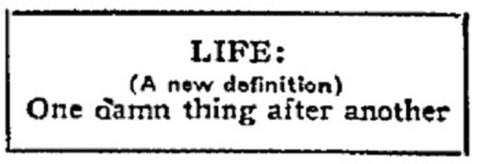
It's incredible how much meaning can be changed by replacing a single word, be it the example cited above or, as I recently learned to my determent, nonflammable and inflammable, especially as it relates to wigs worn during candlelight vigils. But enough about whose head may or may not be covered in second degree burns, we were talking about how life was eclipsed by history.
The very idea of history in western civilization underwent a radical shift during the seventeenth and eighteenth centuries, a vast reimagining that was largely a byproduct of the secularizing effects of what's come to be known as the Intellectual Enlightenment, a sprawling reexamination of the human condition that would go on to birth wonders and horrors beyond measure.

Up to that point, the very idea of what we think of as 'history' today did not exist in Europe. The past and the future were not shaped by the deeds of mortals but the capital-W Will of the Christian God, and while the small-w will possessed by mere mortals allowed you to defy God in the form of sin, it had no effect on the ultimate course of human events, be it a bad thing like you getting the plague, or a good thing like someone else getting the plague.
This changed with the Enlightenment, when the capital-W Will of God was distanced from humanity and replaced with the capital-W Will of Great Men, who were like God but much more likely to suddenly die of cholera. This further metastasized into the idea that history and human progress were shaped by teleological Scientific Laws, and while you could attempt defy them, it had no effect on the ultimate course of events.
This was somehow seen as an improvement, and would culminate in the twentieth century, when a multitude of ideologies all predicated on the idea that the wide-scale extermination of particular social groups would result in an earthly paradise broke out in a violent conflict you probably learned about in high school when an apathetic substitute teacher had you watch the first half of Saving Private Ryan. This global conflagration of indescribable evil, and the Cold War that followed it, redefined what human life was.
However, something that's often overlooked when considering the events that shaped World War Two is how every belligerent party, no matter which side they were on, believed they had already won before the fighting began because they'd chosen the correct ideology that would guide the course of humanity's development. The very idea of there being a right and wrong side of history was a relatively new one, yet the 1930's and 1940's saw it being taken to its logical extreme. All sides, be they Fascist, Communist, Capitalist, Imperial, or some unholy combination thereof, believed that their ideology would eventually, inevitably, result in a perfect world. This process was unavoidable, but it could be hastened to its conclusion by capital-W Will, (versions of the idea that were largely a bastardization of Nietzsche and/or Marx) the Will to hasten this ultimate paradise into being through the application of apocalyptic violence.
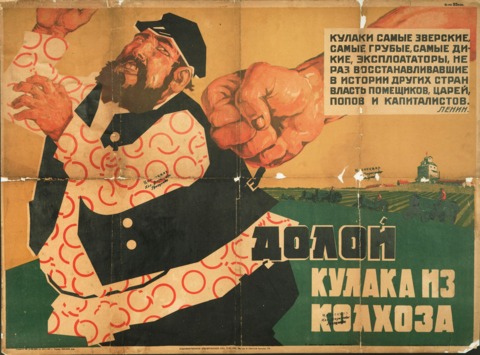
A byproduct of this was the idea of Internal Enemies who thwarted the great destinies of nations and ideologies from within. The impulse to purge internal subversives for the greater good was certainly nothing new, but the ideological fanaticism embedded in World War Two ratcheted it up to a level the world had never seen before. As Hitler saw it, the Will of the German people was so great they could not possibly have lost World War One unless their cause had somehow been subverted from within. He cast blame on everyone who didn't conform to his imaginary standard of Aryan racial perfection, and cultivated the Stabbed In The Back Legend. From Lenin's perspective, his personal brand of Marxism couldn't fail unless it was also subverted from within. He cast blame upon Class Enemies, beginning with the truly wealthy and, after they had all been purged, peasants who possessed more than 8 hectares of land who were saddled with the dehumanizing moniker of 'Kulak', a word which means 'tight-fisted'. Under Lenin's successor Stalin this blossomed into a full-blown liquidation campaign called 'Dekulakification' as the notion of who was and wasn't a Kulak grew increasingly vague until it was detached from any actual standard, and who was judged to be a Kulak was at the sole discretion of who someone in power decided was a Kulak, while Soviet functionaries who didn't meet their Kulak liquidation quota were themselves branded counterrevolutionaries.
This cycle of ever increasing horrors was mentally fueled by a strange kind of doublethink. On one level those in power within these Totalitarian regimes were aware that they were, literally, evil. However, this evil was also seen as merely hastening the inevitable. From this perspective, violence wasn't bad, it wasn't even a sad necessity constituting a bump on the road to Utopia. No matter how distasteful it might be on a personal level, violence was good, virtuous in and of itself, an act of love committed for the sake of all that was noble in the world, and the more savage and cruel you were, the more you loved what was ultimately the greatest virtue. This self-contradictory attitude was effectively summarized in a slogan painted on the walls of a Nazi labor camp for Norwegian boys that read LOVE WHAT MAKES YOU HARD.
Love what makes you hate.
Love what makes you merciless.
Love what is the opposite of love.
Yet a strange thing happened. This ideology, if you can call it that, did not just survive the end of World War Two, it thrived, becoming the guiding principle of nations big and small. No matter what form it was expressed in, be it 'Revolution is not a tea party.' or 'Peace through strength.' or 'When we act, we create our own reality.' or 'If you've got 'em by the balls, their hearts and minds will follow.', the guiding principle of hastening history along to its ideal endpoint, a kind of widescale human sacrifice to the God of Historical Determinism, never went away. This meant that whatever supposedly more humane ideological gloss was superimposed on it to make it seem more idealistic, be it communism, democracy, technocracy, et cetera, it all would eventually be devoured from within and publicly discredited over the course of the twentieth century.
Today, we still live in the hangover of that awesome and terrible century.
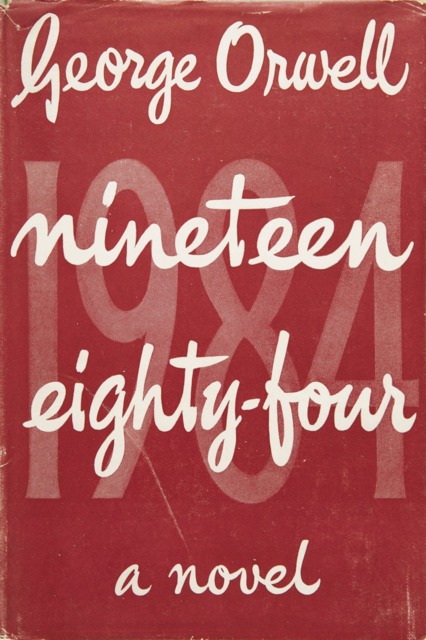
That may seem like a ridiculous assertion for me to make in this ultramodern era, when we inhabit a vibrant future full of technological marvels like fax machines, metal roller coasters, Hitachi wands so powerful their vibrations can bring relief to even the sorest of muscles, and a new improved climate that allows us to incinerate rainforests with a speed and ease our ancestors could only dream of; however, despite all the progress we've made, our lives are still shaped by the unmitigated catastrophes and thoroughly mitigated triumphs that defined the most violent era in human history where, between 1914 and 1991, somewhere between 187 million and 231 million people were killed by war and man-made disasters.
The cancerous idea of salutary violence was far from the only thing that delivered us to our current geopolitical nadir, be it neoconservatism, neoliberalism, neocolonialism, or Neo from the Matrix with his toxic legacy of spoon denial, but I want to focus on the idea of creative destruction due to just how pervasive it is, serving to undergird so many world spanning ideals, even those that supposedly exist in direct opposition to one another. The more these ideals disappear the more the naked force behind them is being exposed, and in the public's imagination it is finally beginning to sink in that the earthly paradise and perfect human beings these ideologies were supposed to deliver are not just on indefinite hold, but now and forever canceled.
We live in The Future That Wasn't, the path we tread as a species littered with the inert remains of discredited ideologies like so much roadkill we wish someone else would scoop up and properly dispose of so we don't have to look at it anymore.
It all begs the question: What now? What's the next damn thing?
I speak not of the fetid corpse of global laissez-faire capitalism, which will continue to shamble forth, absorbing our rebellion and selling it back to us while stealing our privacy, dignity, and hope—its enduring triumph is just a given at this point, and people who suggest that we should maybe not passively allow it to euthanize the planet are immature hypocrites who like to fantasize about a world where we could somehow live without two distinct brands of ketchup.
No, I speak of the most obscene word that can still be uttered in mixed company: politics.
This, believe it or not, brings us to Disco Elysium.
An Anthem in A Vacuum
"Our whole lives consist of pressures to make metaphorical as well as actual bowel movements." -Thomas Ligotti
"If you ever come back again, will you be more than a witness to the weather?" -Sea Power
Disco Elysium is a video game that took the world by storm when it was first released back in the halcyon days of 2019, delighting both critics and the great unwashed gamer masses alike with its incredible storytelling. In a landscape rife with indie role playing games, Disco Elysium managed to rise above its peers and distinguish itself by virtue of its writing—which, in its best moments, is on par with the highest standards of literary excellence. The prose is gorgeous, the characters vividly realized, the worldbuilding rich and varied, the main plot compelling, the ideas clever, the humor extremely hit-or-miss though comedy is so notoriously difficult in video games it's hard to really chide Disco Elysium for it.
No hint of this quality will become apparent until you're at least two hours into the game, which makes a very bad first impression very much on purpose, hurling you into a repulsive and degrading world that's kind of like a visual novel where every character is the tsundere character, and also you smell like piss. A rancid corpse still hanging from a tree days after it was lynched will make the character you play projectile vomit multiple times. An indigent child hurling rocks at said corpse for kicks will scream so much heinous invective at you it will make you feel sorry for the voice actress who had to say it. A tattooed body builder will harangue you with endless monologues detailing his uniquely incoherent vision of scientific racism, outlining your genetic inferiority in microscopic detail. The innate hostility of the world you inhabit is established within the very first minutes of starting the game, and will persist as a thread running through the entirety of its story.
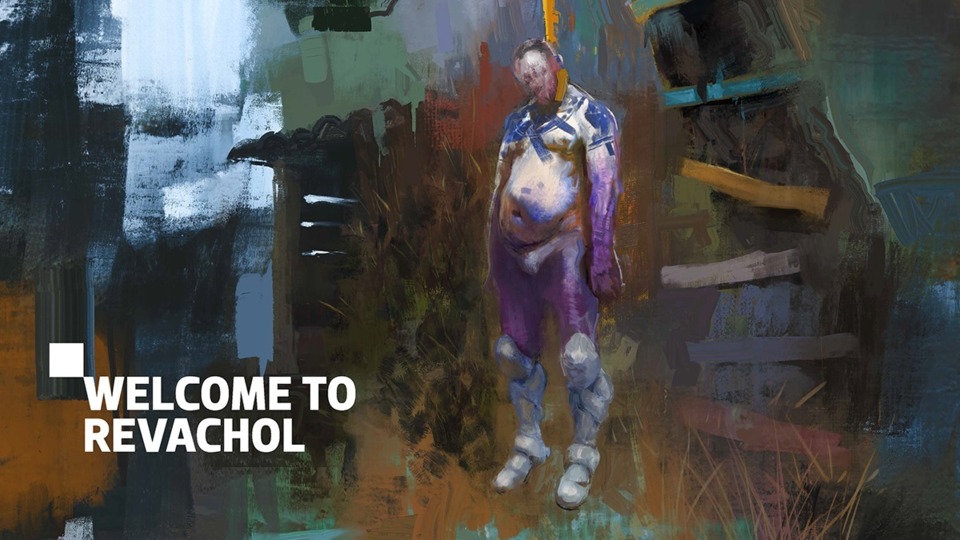
Disco Elysium begins, as these things so often do, with you floating in a jet-black void and a disembodied voice asking you if you want to linger in this state of insensate limbo or face stupid reality again. If you tell the voice you want to return to consciousness it will try to dissuade you, describing the world as an awful place rife with pain and misery, a place so abjectly horrible you have already driven yourself to the verge of oblivion attempting to escape it via heroic drug abuse and flamboyantly self-destructive behavior.
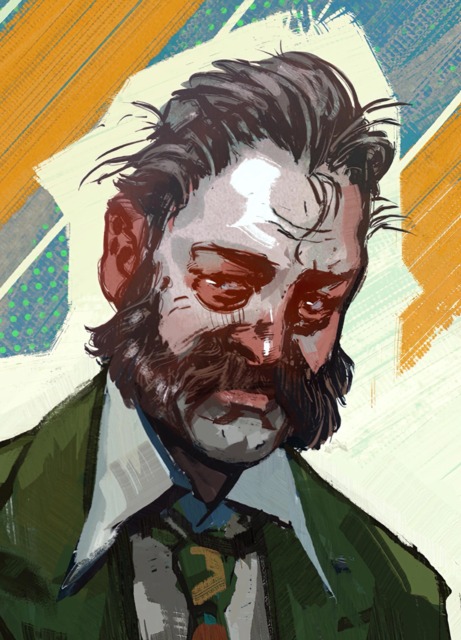
The developers of Disco Elysium, seemingly aware that a two minute long video game about not existing wouldn't fare well in today's competitive marketplace, eventually force your hand, hurling you out of comfortable oblivion and into the profoundly shitty life of one Harry de Bois, who is sort of a detective, or at least used to be.
Being a role playing game, Disco Elysium is legally obliged to give the main character amnesia. The result is that not only does Harry not remember anything about the world and his place in it, he remembers nothing about himself, be it his personal life, his career as a cop, or his own name. As a result the man he once was has effectively been erased from existence, even as he's left to deal with the consequences of every deed that bygone individual committed.
As you begin playing Disco Elysium it quickly becomes apparent that you were, at least in the recent past, a deranged monster who ignored his duty, abused his authority, wrought pain and destruction wherever he went, and in general really put the B in ACAB. The result is every other character in the game who's had any dealings with you or knows anything about you regards you with a potent mix of resentment and disgust.
It's a state of affairs that unceremoniously thrusts you into a world where you are instantly cursed with a crushing historical burden you never asked for and want nothing to do with, but can't possibly escape. You'll find this condition mirrored in the outside world as you continue the game and learn more about the island of Revachol you've arrived at the course of investigating a murder, a place that has been butchered by history and left to die in the gutter, a place where every attempt at real progress has been thwarted and sabotaged, leaving nothing but ruins both literal and ideological, a no man's land where the only people still thriving are the boated vermin shamelessly feeding on the fetid remains of murdered hope.
But enough about how fun playing Disco Elysium is, let's dive into the game's mechanics.
When Disco Elysium was first released, a popular refrain among commentators was how similar it was to a tabletop role playing game, a characterization that manages to be both superficially true and wildly inaccurate. While the mechanic that determines how events unfold in Disco Elysium does resemble the dice roll skill checks used in tabletop role playing games, that's where the similarity ends. Indeed, if Disco Elysium really was a tabletop role playing game, it would be one presided over by one of the shittiest game masters to ever wield an icosahedral die.
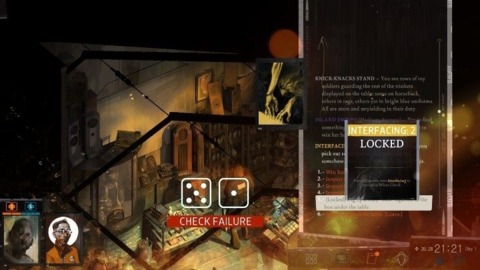
The fact is, a tabletop role playing game isn't really a game at all in the conventional sense; it's a form of improvisational interactive storytelling where, crucially, the whole point is to keep the story going no matter what. If you fail, the story progresses while you deal with the consequences of that failure, the game master does not just say “Nothing happens, go do something else.” The fact that this is precisely how Disco Elysium operates the vast majority of the time doesn't ruin the game, but to say the freedom it offers is equal to that of a tabletop role playing game is to hold Disco Elysium to an impossible standard, and set players up for disappointment. It's also to overlook a fundamental aspect of the game: It is, to a great extent, about failure—individual failure, collective failure, societal failure, failures of ideology and justice and personal growth.
Not only is Disco Elysium about failure, it is not about overcoming or transcending that failure, but finding a way to cope with the immutable fact of it. How can we live in Disco Elysium's world of fallen idols, compromised values, and a drug-fueled bender so intense we can't find our pants and must traverse snowy Revachol in merely our briefs, with all the shrinkage that implies?
Disco Elysium is not about saving the word, galaxy, universe, et al. Not only is the game confined to a space of about three city blocks, the outside world is depicted as both inconceivably vast and profoundly nebulous; no matter how much lore you chose to imbibe as you play the game there is a looming sense that, while you can achieve a certain level of understanding of the world you find yourself in and the forces that shape it, none of it will ever actually make sense—not in the way you want it to, not in a way that will justify the present.
This highly specific feeling is remarkably similar to the feeling that will gradually accumulate inside you if you study enough real world history, a sense of persistent incoherence that's fundamental to human behavior on all levels, from individuals to civilizations. You will find yourself living this contradiction as you play Disco Elysium, finding it everywhere as you study the murder at the story's center, and trace the way it resonates through both society and yourself.
As you progress through the game the world around you will grow larger as you familiarize yourself with the three blocks of Revachol and the multitudes they contain, with each new day bringing you more to grips with just how little an impact you can possibly hope to have on your environment, which brings me to my biggest gripe about the game, which is also my most specious, one that gets the facts right but misses the point entirely:
It won't let me win, no matter how hard I try.
There are two types of skill checks in Disco Elysium that come into play whenever you try to do something of significance: White Skill Checks, which are repeatable provided you've put another experience point into the ability that was tested, and Red Skill Checks, which can only be attempted once and, if failed, are failed forever and ever, amen.
The Red Skill Checks don't start having any profound, immutable effects on the story until you reach Disco Elysium's big turning point, when tensions between the striking workers who have taken credit for the lynching and the private military contractors seeking to both break the strike and avenge their murdered comrade come to a violent head. It is also at this point that the hand guiding the events of Disco Elysium is revealed, and the game's much vaunted pretensions to player agency collapse as you realize the one thing that would've prevented this, namely finding the real murderer, is exactly what the game's developers are determined to prevent you from doing. It doesn't matter how much time and effort you've poured into solving the case, it doesn't matter if you've gone through every piece of evidence in minute detail, how much work you've put into seeing through the fog of lies, and even if you've managed to arrive on the killer's proverbial doorstep. Disco Elysium forcefully halts your progress, strips you of agency, and hurls you into a scenario that, given your failure to solve the murder, will inevitably result in massive tragedy.
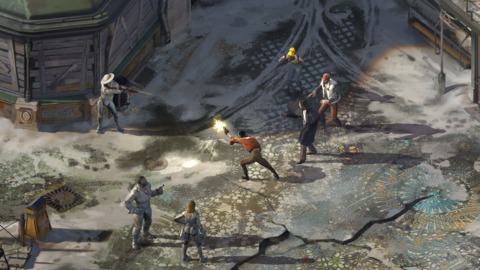
It doesn't stop there. After you've suffered mandatory grievous bodily harm and lose consciousness, you'll wake to find whatever progress you've managed to eke out in ruins, with vital witnesses and supposed allies having either fled or disowned you, and with access to a third of Revachol forever cut off.
It is a cascade of disasters that will naturally make you, both as a player and the character you inhabit, wonder just what the hell the point of all that effort you invested was.
This unavoidable question will loom heavy over the remaining portion of the game as you slowly realize Disco Elysium's developers are just as tormented by the enigma of why anyone would persist in the face of utter futility as you are. Inquiring into the degraded world of Revachol and your degraded place in it is fundamental to the narrative, but prior to this disaster it was also one you could manage to ignore by devoting your attention to solving the murder. Disco Elysium rips away your pretensions to impose order on the world by shoving a vulgar display of meaninglessness in your face, one that violently disabuses you of any sense of control and leaves you staring down the barrel of how anyone picks up the pieces and moves on when there are no pieces to pick up, and nowhere to move on to.
It also raises the question of what message the game's developers are trying to convey, and what confluence of factors led them to the point where they were willing to take such a massive risk in deliberately alienating the people playing their game.
To answer that question we're going to have to take a historical detour of the sort so common in Disco Elysium, returning to the nonfictional dystopia you and I currently inhabit and taking a sojourn to the land of Disco Elysium's birth, a nation whose unique history has managed to foster a distinctive and prescient perspective on the relentless churn of one damn thing after another that so many of us are just now beginning to come to grips with, or be gripped by.
To Estonia we go, home of Disco Elysium's developers, the historical turmoil that so influenced it, and the world's only Depeche Mode themed bar.

Estonia? I Barely Know ia!
"A nation is a group of people linked together by a common error about their ancestry and a common dislike of their neighbours." -Karl Deutsch
"It starts with love for foliage and ends in camouflage" -British Sea Power

Simply looking up Estonia on a popular mass media platform such as YouTube is to expose yourself to a barrage of focus grouped bullshit about the nation's thriving tech economy and fervent patriotism—a rosy portrait that, while not necessarily untrue, reveals very little of historical significance.
Since these inquires yielded nothing concrete about the people of Estonia beyond the fact that they have a cool goth flag and their winters are colder than a pimp's heart, I ventured out in search of something a tad more in-depth, if only to refine my knee-jerk prejudice into something more substantive.
To that end I'm going to quote this summary of Estonia's history from legendary travel writer Rory Maclean's book PRAVDA HA HA(2019) verbatim, since I can't hope to improve upon it:
Estonia is less than half the size of Portugal but as strategic as Gibraltar. Its people—one of Europe's earliest indigenous tribes—have been shaped by seven centuries of occupation under Danes, Teutonic knights, Swedish kings and the tsars. Russia governed the country until 1917 when—for neither the first nor last time—the Estonians drove them away. But the country's location, at the head of the Baltic, able to defend or lay siege to nearby St Petersburg, doomed their fragile independence. With the hated Molotive-Ribbentrop Pact, the dictators' dirty deal that divvied up Eastern Europe in 1939, the Soviets enslaved Estonia for another half century, plus three war years when the Nazis nabbed it for themselves.
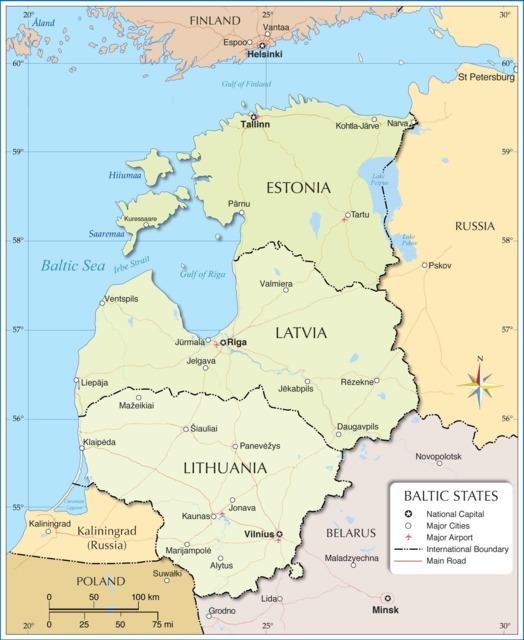
Before regaining its national sovereignty in the 1990's, Estonia functioned as the northernmost of the USSR's Baltic buffer states. Today it sits atop a geographic layer cake of Latvia, Lithuania, and the odd little exclave of Kaliningrad Oblast, a minuscule satellite state of Russia.
Similar to other long-disputed regions like Korea and Cyprus, Estonia is a small country that's been subject to a vastly disproportionate amount of historical turmoil, its unique geography placing it at the intersection of more powerful neighbors who use it as a bargaining chip/whipping boy in the course of endless imperial squabbles to the inevitable detriment of the people who actually live there, one of whom just happens to be Robert Kurvitz, the person most responsible for Disco Elysium's existence.

This is a statement Robert Kurvitz himself would immediately take issue with, saying the development company behind Disco Elysium, which bears the inscrutable name of ZA/UM, is a horizontally organized collective where responsibility is spread equally among collaborators. It's an objection I respect, take to heart, and am going to more or less ignore, because by god some individual has to take responsibility for this thing, and it might as well be the guy who literally wrote the book on Disco Elysium—or the book it's based on, if you want to get technical, which I obviously do.
As an Estonian born in 1984, Robert Kurvitz was in the uniquely privileged position of having a front row seat to the great geopolitical shitshow that was supposed to be the end of history—definitely, for real, we mean it this time.

As a child he grew up in the gray shadow of the great slouching Soviet colossus, a moribund empire where you couldn't get fresh fruit to save your life but boy, if you like thousands of tons of low grade steel unfit for any conceivable use, do we have a centralized command economy for you.
The Soviet system imposed throughout Eastern Europe sucked, but it was at least a stable kind of suck, a state of affairs where, for the vast majority of people, conditions at least weren't getting worse faster than you could adapt to them. You had an apartment, you had a job, you could see a doctor, and even if all three weren't good, you could console yourself with the knowledge that, except for a vanishingly small sliver of elite party cadres, everyone else had it just as bad as you did, and as long as you were willing to queue for three hours you could count on receiving something that looked like bread and get home in time to watch a static-laden broadcast of the erotic adventures of Emmanuelle via a pirated Finnish TV signal.
Then a scrappy young go-getter named Mikhail Gorbachev, determined to save the faltering Soviet Union through reform, introduced sweeping campaigns of transparency (Glasnost) and restructuring (Perestroika) into a system whose existence was dependent on a total absence of both, and the USSR folded like a cheap babushka. Estonia had free elections for the first time since World War Two in 1990, and declared its full independence in 1991.
Yet again Pizza Hut depicts world events with more insight and nuance than any politician or journalist, standing as the ultimate defender of truth and those delightful red soda cups.
Though Estonia's experience of 90's wasn't nearly as catastrophic as some other regions of suddenly autonomous Eastern Europe, it was nonetheless a time of chaos and uncertainty as the optimism brought about by the fall of the Berlin Wall evaporated in a haze of economic devastation and mediocre Eurovision contests. Still, things slowly but steadily improved for plucky Estonia, with its economy growing at an annual rate of nine to ten percent. Their fervent embrace of education, technology, and western market capitalism bore fruit, and the standard of living soared for many—though crucially, not all.
The rapacious churn of capital has, as always, created a society divided into winners and losers. While wealth inequality in Estonia isn't as bad as in other nations such as Russia and the United States, conditions are dire enough for it to constitute its own fun-sized dystopia with, as of 2018, the bottom 50% of Estonians owning 18.1% of the national wealth and the top 10% owning 35.5%. Those who haven't managed to carve out a spot in the country's nascent technocracy have, to the extent that they're able, voted with their feet, then with a boat, then with their feet again, with a hundred thousand Estonians emigrating to nearby Finland with no intention of returning.
Meanwhile, the grim legacies of the Nazi and Soviet occupations endure, continuing to foster tensions between ethnic Estonians and the large Russian minority. The social and financial status of the two groups have flipped since the Soviet collapse, thus generating resentments that continue to simmer and, occasionally, explode.
Despite its current independence, Estonia still exists as a patchwork collage of its colonial past. Even the name of its capital city of Tallinn means Danish Fortress. The words for Tallinn's neighborhoods are German, while its churches are named after Russian saints. When the USSR collapsed and the statues depicting Lenin and Marx were torn down, they weren't replaced with statues of Estonians, but rather symbols of other, different foreign occupiers the Estonian people remembered more fondly, such as the Swedish lion, while new memorial plaques commemorated the sacrifices of Finnish soldiers.


When the small town of Pärnu did finally opt to erect a public statue of an Estonian soldier in 2002, it depicted him wearing a goddamn Nazi SS uniform. The unveiling was canceled, only for the statue to be relocated, Nazi uniform and all, to a cemetery in the village of Lihula. Meanwhile, the sizable Russian minority objected to having statues of Russian soldiers commemorating the Red Army's victory in the Great Patriotic War being removed. The resulting years-long fervor over which monstrously evil regime got to have their own metal guy with a rifle to show how great they were served to tear the nation apart, generating a string of increasingly violent protests that would ultimately culminate in 2007 with three days of riots, looting, and arson in Tallinn that would come to be known as either the April Unrest or Bronze Night, depending on who you ask. The chaos only ended when it was eclipsed by another, different kind of disaster, this one taking the form of a vicious retaliatory Russian cyberattack using DDoS botnets to crash government, banking, and communication networks.
Now, as always, Estonia stands astride the bleeding edge of history, getting into massive Russian cybersecurity breaches and people beating each other to death in the streets over statues before it was cool.
Enter Robert Kurvitz, aspiring artist-cum-grudging video game developer.
For the majority of his artistic endeavors prior to the success of Disco Elysium, Robert Kurvitz was something of a Renaissance Man of Failure, a term I sincerely mean as the highest praise, not only because I identify as a failure myself, but because I believe Kurvitz managed to use his thwarted efforts to inform Disco Elysium's creation, fostering the unique perspective that would serve to make the game so thoroughly exceptional.

Robert Kurvitz sought out different avenues of artistic expression before finally embarking on the project that would become Disco Elysium, including playing in the rock band Ultramelanhool and writing the novel Sacred And Terrible Air. Neither efforts went anywhere, though Sacred and Terrible Air would eventually form the basis of the world Disco Elysium is based in.
I would offer my opinion, but I'm ashamed to admit I'm not nearly as up on the Estonian Art Rock scene as I should be.
Making art with any appeal to a mass audience is difficult under the best of circumstances, and is only complicated further by attempting to graft a political message onto it, a delicate balance few artists manage to effectively strike—for example, the Marxist playwright Bertolt Brecht's long running collaboration with composer Kurt Weill came to an end when Brecht insisted on introducing more and more politics into their productions, with Weill later commenting he was unable to “set the Communist Manifesto to music”.
Too much politics and art becomes propaganda, too much art and the message becomes inaccessible, yet cleanly severing art from history's unending barrage of one damn thing after another tends to be more difficult in a place like Estonia. Though history is no less present in a place like the Americas, it is easier to ignore, fostering a situation where it's possible to live your whole life in a town without knowing it's named after a native tribe that was wiped out by encroaching settlers. The past isn't as past in Estonia, where you can live in an apartment bloc named after a fallen hero of the Great Patriotic War you happen to know was actually a looter one of your distant relatives shot in the forehead.
In Disco Elysium, developer ZA/UM seeks out the universal in the particular, incorporating elements of Estonia's history, politics, and even geography into a grim pastiche that, for better or worse, seems to reflect the political moment we now inhabit more accurately with each passing day.
31 Flavors of Futility
"Politics is, in this era, either an affectation or a distraction." -Virgil Texas
"The human nature show has got no place to go, it's all just effigies and girls in magazines" -Sea Power

It may seem odd to praise Disco Elysium for having a fine, gourmet appreciation of racism, but the way it's applied in the game goes a long way towards establishing a richer world and deeper characters, something that goes beyond the usual 'humans bad, orcs worse' fare of your typical RPG in order to show how different people deploy different varieties of racism to different affect, be it base resentment, nostalgia for a fictional bygone paradise of racial purity, or the idiot sophistry of so-called scientific racism. Disco Elysium is also not so naïve as to depict it being somehow possible to talk a person out of being racist within the span of a single conversation. In fact, one of the things that comes across as you progress further into the game is its acute understanding of just how resistant people are to change of any kind, be it in the world around them or within themselves.
A degree of politics is present in most RPGs in some form, but it's also usually a simple binary choice between either one side that is obviously good and one side that is obviously evil, or a stuffy bureaucracy vs a dynamic man of action or dynamic woman of action or dynamic bionic commando with his dead wife in his robot arm of action. Disco Elysium, by contrast, dives headfirst into the bottomless cesspool of Realpolitik views and the people who hold them, be they simple, elaborate, or dumb as shit.
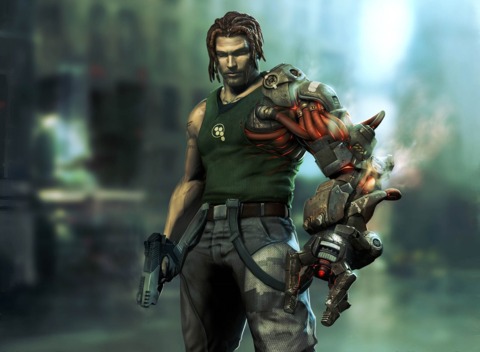
Introducing this level of real world complexity has the corresponding effect of rendering the problems in the world of Disco Elysium just as intractable as they are in real life, denying you the sense of agency and the glow of accomplishment you'd get out of playing a RPG with simpler conflicts you could solve with good old fashioned violence, instead forcing you to trudge through the desolation of endless ideological quagmires. Crucially, Disco Elysium also makes no attempt to hide just how ineffectual you really are, with the opportunities to bring change to Revachol ranging from the meager to the nonexistent. The ideology you chose to adopt in Disco Elysium is almost completely performative, having no real bearing on how events actually play out, a state of affairs that mirrors the real world political situation we currently find ourselves in with disturbing accuracy.
The political affiliations available to you in Disco Elysium, as Dorthy Parker once said, run the gamut from A to B. You can be an ineffectual communist, an ineffectual fascist, an ineffectual moderate, an ineffectual mad prophet, or ineffectually apathetic. Not only will it have no impact on the world you occupy, it will have extremely little bearing on how people treat you. You can never be enough of a communist for the communists, enough of a fascist for the fascists, enough of a racist for the racists, or enough of a drug fiend for the drug fiends. It's like missing the first week of high school and arriving later to find everyone has already arranged themselves into tight impenetrable cliques, leaving you an outcast that only exists for people to compare themselves to and be glad they're not.
As you progress through Disco Elysium's story you'll quickly learn you have little to gain by forging actual convictions, and the best you can do is attempt to be all things to all people, doing everything to can to convince them their interests align with yours, flattering and cajoling and lying and threatening your way across Revachol in the unflagging pursuit of some impossibly vague notion of justice.

None of this is to say there's nothing to be gained by interacting with the world of Disco Elysium. While you're ostensibly in Revachol to investigate a crime, said investigation is also just an excuse to hang out in the game's vividly realized world, acquainting yourself with its grim history and desperate characters. There are a hundred different ways people are attempting to cope with the world that's quickly unraveling around them, flailing for any straw they can possibly grasp at. In the course of the game you'll find people taking refuge in taxidermy, cryptozoology, science, hate, violence, politics, vandalism, alcoholism, or, god help us, artistic expression—though, however these approaches play out, the vast majority of people you encounter harbor few aspirations beyond muddling through one more day without losing what little they've managed to cling to.
As Disco Elysium begins Revachol's commerce has ground to a halt due to a fractious strike among the dockworkers, yet all this tension is shot through with a much more important existential problem, a sense of melancholy resignation that hangs over everything, a grinding apathy in the face of unresolvable conflicts that were present long before you arrived, and will endure long after you are gone, no matter what impact your successes or failures manage to inflict on the world around you. If Disco Elysium had an overdramatic name of the sort typical to golden age pulp science fiction, it would be something like THE WORLD WITHOUT SOLUTIONS!, and the more facts you collect, the more acutely you understand just how deep the problems afflicting Revachol really are.

Disco Elysium rewards you not just for having knowledge, but in-depth knowledge. It does not just want you to know what communism is, it wants you to know what a reactionary is. It does not just want you know what a king is, it wants you to know what a constitutional monarchy is. A knowledge of historical context serves to enrich the entire game. Knowing what the Paris Commune was and why it failed makes it easier to understand what the Revachol Communist uprising was and why it failed. Knowing the depraved legacy of Russian tsars makes it easier to understand what Revachol's monarchs were like. Disco Elysium doesn't just want you to know history, it wants you to know that the history of all hitherto existing societies is the history of class struggles. The game is enriched by having a working knowledge of history, art, politics, philosophy—essentially everything you can learn about in college and never, ever get someone to pay you for.
Despite the mass profusion of ideas in Disco Elysium, elements of religion are most notable for their conspicuous absence, which is only to be expected from a game conceived in Estonia, a nation overwhelmingly comprised of atheists. Disco Elysium treats religion the same as all the other half-baked ideologies discredited by the flow of time, one more damn thing in the endless parade of damn things. There is a single lone church in the world of Revachol, a long-abandoned ruin inhabited by vagrants that's said to be haunted, though if you follow its related questline there will ultimately prove to be an explanation just as worldly and mundane as every other obstacle in the game. Disco Elysium seeks nothing transcendent in religion, regarding it as just one more intellectual dead end whose central object of worship, the prophet Dolores Dei, inspired the same kind of meaningless violence encouraged by all other demagogues seeking political power, be they nationalists, monarchs, or theocrats.
The object at the center of all this, the spoke around which the world of Disco Elysium turns, is the one you see your character standing atop in a raging, drunken fury every time you boot up the game, a man-made symbol freighted with history: the Horseback Monument.
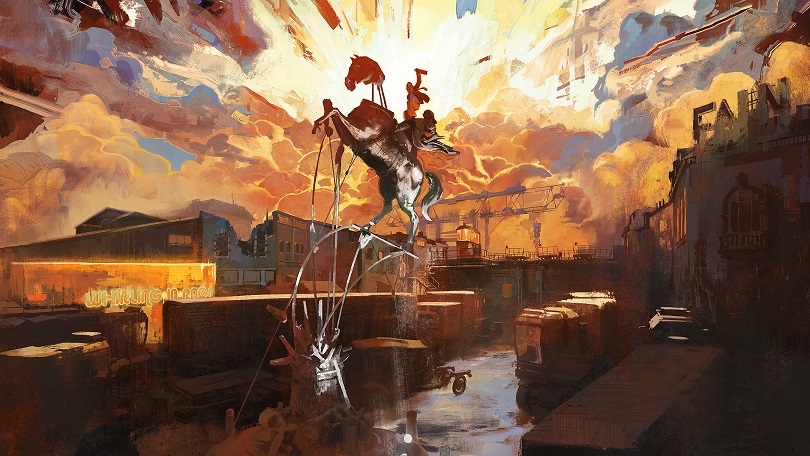
The Horseback Monument is a symbol of Revachol's imperial past that was first blown up by communist rebels, then blown up even more when their uprising was violently quelled via indiscriminate bombing. The Horseback Monument's remaining detritus was eventually salvaged and pieced back together in such a way as to depict the very moment of its destruction, freezing it mid-dismemberment. A silver plaque identifies the subject of the Horseback Monument as Filippe III The Squanderer, the monarch whose immense profligacy doomed Revachol to ruin, generating the very crisis that spurred the city's communist uprising, and the statue's subsequent destruction.
It all begs the question: How did it come to this? Why is the human condition so broken that efforts to improve it are not just undermined, but viciously punished? Disco Elysium has a direct answer, one it presents to the player before the game even begins.

The quote that opens the game is from Welsh poet R.S. Thomas' poem Reflections, from his collection No Truce With The Furies. It's a poem that so affected Robert Kurvitz he originally wanted No Truce With The Furies to be the title of the game, only later changing it to Disco Elysium and settling for quoting Reflections when the game begins. While Reflections itself is magnificent, you only have to know what the line No Truce With The Furies is referencing in order to immediately understand the point R.S. Thomas is trying to make, which is the same point Robert Kurvitz and ZA/UM are trying to make.

All it takes to understand the title's significance is an intimate working knowledge of ancient Greek theater!
Specifically the tragedies of classical Greece!
Specifically the works of the tragedian Aeschylus!
Specifically the Oresteia trilogy!
Specifically the last play in the trilogy entitled The Eumenides!
Specifically how the play The Eumenides ends!
Specifically how it's an allegory for civilization eclipsing barbarism!
I'll explain a little.
The Most Unkindliest Cut of All
"Intent and outcome are so rarely coincident." -Neil Gaiman
"Two fingers for the dead, two fingers for the living, two fingers for the world that we all live in." -Sea Power
Despite their origins in Antiquity, Greek Tragedies continue to inspire and move people to this very day thanks to their rich and nuanced depiction of universal human themes like duty, justice, and accidental incest.
If you're an American, or one of the many people from another country who know more about American history than most Americans do, (don't be too proud of yourself, it's a very low bar) your most likely exposure to the Oresteia trilogy written by the Greek playwright Aeschylus in the fifth century B.C. is not from any direct ancient source, but a far more recent period in history.
On April 4th, 1968, Martin Luther King Jr. was assassinated. At the same time, then-presidential candidate Robert Kennedy was scheduled to give a speech before a group of supporters in Indianapolis. Upon learning of the assassination he didn't cancel the speech, but rather accepted the grim duty of informing the crowd that the iconic civil rights leader had been murdered. (Before we idealize the situation, let us remember that when Robert Kennedy was Attorney General he personally authorized the FBI's wiretapping of Martin Luther King Jr.'s phone conversations, recordings the FBI would later use in an attempt to blackmail King into committing suicide.)
After his elder brother John F. Kennedy was assassinated in 1963, an inconsolable Robert Kennedy, whose Catholic faith had been shaken to its core, eventually sought refuge in reading classical Greek tragedies, accruing knowledge he would later deploy when announcing Martin Luther King Jr.'s death. After delivering the dire news to a horrified audience he offered this quote from the tragedy of Agamemnon, the first play in the Oresteia trilogy, as grim consolation: [skip to 2:45 if video starts from beginning]
“Even in our sleep, pain which cannot forget falls drop by drop upon the heart until, in our own despair, against our will, comes wisdom through the awful grace of God.”
Alternately, if you prefer Ska to history (and who doesn't) you're more likely to know this quote from its use by the Mighty Mighty Bosstones in this extremely tasteful musical tribute to the murder of George Floyd.
Classy as fuck.
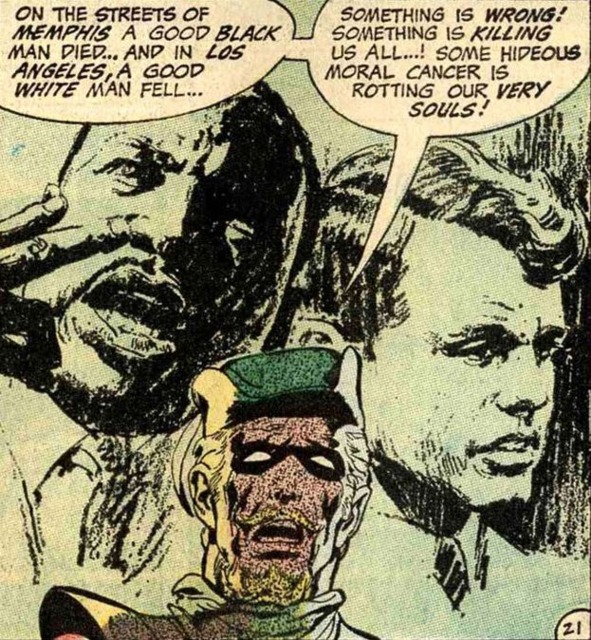
Robert Kennedy would himself be assassinated almost exactly two months after King, and the dual successive tragedies would serve to fuse the two figures in the popular imagination, further enshrining Robert Kennedy's Indianapolis speech as an exemplar of Tragedy, American Style. It also serves to illustrate the incredible enduring relevance of plays such as Aeschylus' Oresteia Trilogy despite the millennia separating them from the present, influence that extends to the poet R.S. Thomas, who so inspired video game developer Robert Kurvitz with his book No Truce With The Furies and the poem Reflections therein, which contains the titular line.
Since knowledge of the Oresteia Trilogy can enrich our experience of Disco Elysium so much, let's take a look back at it as quickly as possible lest we get bored.
To make a very long and complex story very short and simple, (No matter how much it pains me, I'm going to restrain myself from addressing the menstruation imagery.) the Oresteia trilogy is the tale of primitive, retributive justice and barbarous blood feuds being replaced with advanced, civilized trials by jury; as well as how crude vengeful gods were refashioned into benevolent patrons.
Agamemnon, the first play in the trilogy, begins with the titular warrior-king returning in triumph after his decade-long siege of Troy, having destroyed the city, killed or enslaved all its people, and looted everything of worth, which in this case includes the doomed prophetess Cassandra, who he's taken as his consort and brought back to his kingdom of Mycenae to meet his wife and young'uns, one of whom is notably absent.

Ten years before the play begins (most Greek Tragedies take place within the span of a single day) with his armies assembled at Mycenae and ready to depart for Troy, Agamemnon was faced with a quandary. The wind refused to blow, making sailing to Troy impossible, and his soldiers were beset by plague. A prophet informed Agamemnon that he had incurred the wrath of the goddess Artemis, and only a great sacrifice could placate her. Obliging fellow that he was, Agamemnon sacrificed his own daughter Iphigenia. With Artemis appeased the plague abated, the winds blew once more, and Agamemnon departed for Troy, leaving his wife Clytemnestra to rule in his stead.
If Agamemnon expected his wife to have come to accept his murdering their daughter with gentle good humor over the intervening ten years, he is sorely mistaken. In the course of the play Clytemnestra kills both Agamemnon and his consort Cassandra after he returns home, with Aeschylus adding the colorful detail of Clytemnestra stabbing Agamemnon to death while he's taking a bath, making for easy cleanup.
The following play, The Libation Bearers, depicts Orestes, the adult son of Agamemnon and Clytemnestra, agonizing over whether or not to kill his mother. Duty demands that he avenge his father, yet duty also demands he not break the ultimate taboo of shedding family blood, which will incur the wrath of the dreaded Furies, a trio of goddesses who enforce justice by hounding perpetrators, driving them first to madness, then ultimately death. Orestes eventually decides his duty to his father surpasses his duty to his mother, and kills Clytemnestra. He then flees the royal palace, knowing the Furies will follow.
The last play in the trilogy, The Eumenides—another name for The Furies, meaning Gracious Ones or Kindly Ones—depicts Athena, Greek goddess of wisdom, just war, and expository dialogue intervening on Orestes' behalf to end his torment at the Furies' hands by instituting a new brand of worldly justice, bringing about the Truce With The Furies that makes civilized society possible, replacing personal revenge with institutional law.
In retrospect this is, of course, cold comfort coming from a civilization that was still based on slavery, sexism, pederasty, and constant war, but on the other hand they eventually did manage to replace inferior Doric columns with the far superior Ionic columns, so it all evens out in the end.

In The Eumenides Athena convenes a twelve man jury of Orestes' peers, testimony is given, and the group of men is called upon to deliver a verdict based on their own reasoning. This is a massive turning point for civilization, the moment when the arbitrary vengeance of gods is replaced with the rational judgment of mortal men, and in a portent of things to come they instantly fuck it up, becoming deadlocked in a six to six vote. The tie is broken by Athena who, despite being a goddess herself, is still a character in a play written by and for Ancient Greek patriarchs, and thus votes to acquit Orestes, declaring his father's life to be worth more than that of his sister and mother, thus setting a precedent for institutionalized sexism that would endure through through the ages until Beyoncé invented feminism in the early twenty first century.
The Furies are naturally outraged by this. Not only have they been denied their prey, their purpose has been negated, the very reason they exist rendered null and void. Athena responds by making the best of the situation. Instead of simply ridding herself of the Furies by condemning them to Tarturus as her brute of a father is so fond of doing with undesirables, Athena reinvents The Furies, giving them a new, benevolent purpose as the patron deities of Athens, transforming them into The Eumenides, The Kindly Ones. This is what is meant in another, less well-known line from Aeschylus: “To tame the savageness of man, and make gentle the life of this world.”
Thus is born the all-important Truce With The Furies: civilization replacing barbarism, justice replacing revenge, sophisticated gods replacing cruel ones; the very invention of the social contract that makes order possible, and the very thing that is so notably absent in Disco Elysium, as described by R.S. Thomas' poem Reflections:

One of the very first things you can do in Disco Elysium upon first waking up in your trashed hotel room with no memory of who you are and what you've done, is look in the mirror.
I never did.

During my entire time playing Disco Elysium, from beginning to end, my character of Harrier "Harry" Du Bois had no idea what he looked like. I don't know if this had any effect on the actual gameplay besides my character portrait in the bottom left hand corner of the screen remaining a vague, impressionist smear, but at the time it seemed like the right thing to do in a game where identity was such an accursed thing, inevitably contaminated by a past consisting of almost nothing but geological strata of mistake layered atop mistake layered atop mistake, both personal and societal.
This is the genius of R.S. Thomas' poem. Reflections seamlessly interweaves personal and public tragedy, portraying how they inform and reflect one another, how by failing to tame the Furies within we allow them to run wild without and vice versa, dissolving the bonds that should allow us to cleave to one another and leaving us as something less than civilized, less than we should be, less than human.

The chalice mentioned in Reflections is, continuing with the theme of Ancient Greece, a likely reference to the chalice of fatal hemlock the philosopher Socrates famously quaffed to end his life after he had been sentenced to death by an Athenian jury for corrupting the city's youth by opening unquenchable cans of philosophical thirst-worms. Socrates' dialogue with his followers explaining why he's willing to die rather than escape to a life in exile, chronicled in Plato's Crito, would go on to inform future ideas of civic virtue and the social contract.
For a citizen of Ancient Greece, the worst thing that could possibly happen to you, far worse than poverty, slavery, or even death, was exile. To be a person without a city, a community, a polis, was a sort of living damnation. Being deprived of civilization was to be deprived of grace, to have the one light of wisdom holding back a dark universe of idiot barbarism snuffed out. In this way Ancient Greeks had a far clearer grasp of what rugged individualism actually consisted of than many people do today, a world of cruel old gods and endless blood feuds, the Hobbesian war of all against all.
It's a state of affairs Estonians know all too well. Having watched their government and society implode with clockwork regularity every generation or so, they have come by their cynicism honestly, and one reason Disco Elysium's unrelentingly bleak political message has proven so resonant with people of all nations is that it's coming at a time when old politics are infesting the world in new ways, the freshly untamed Furies extending their tendrils to the first world in a way they haven't in generations, into countries that believed themselves immune to such reactionary violence, the self-declared bastions of western liberal democracy that were supposed to be the guiding light of the civilized world, as they were so fond of reminding us.
It's a fresh hell that's even managed to affect the rock band that provided the soundtrack to Disco Elysium; a band who, in the course of weathering history's relentless barrage of one damn thing after another, have been forced to disassociate themselves from a culture that's become unrecognizable to them.
And Their Refinement of the Decline
"The only thing worth writing is the human heart in conflict with itself." -William Faulkner
"Is that what the future holds? Kevlar or cherry wood? Malevolence or good?" -British Sea Power
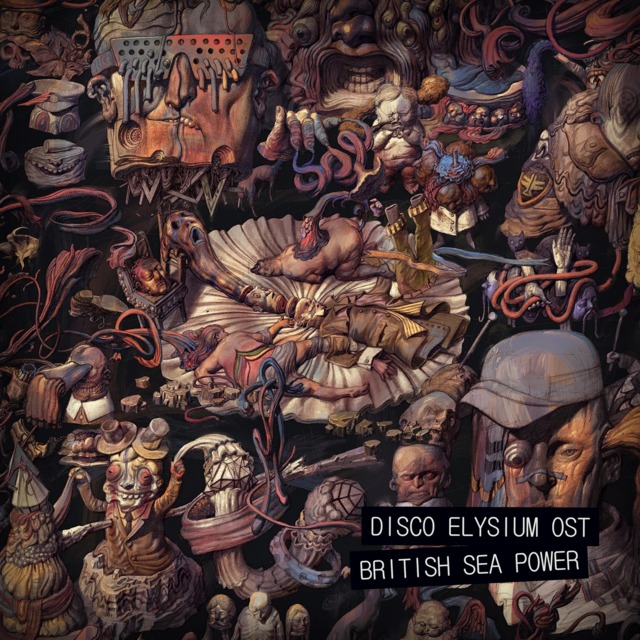
Disco Elysium's soundtrack is composed and performed by the rock & roll band formerly known as British Sea Power, a visionary union of complementary artists that has only grown more apropos since the original version of Disco Elysium was released on October fifteenth, twenty nineteen.
Disco Elysium - The Final Cut (the version I played) was released on March thirtieth, twenty twenty one, a scant two months before British Sea Power publicly announced they were changing the band name they'd been going by for over twenty years, dropping the 'British' and venturing forth as 'Sea Power' alone. It was a choice that was the grim result of history's relentless parade of one damn thing after another changing the world around them to the point where their own name—which had been tongue-in-cheek to begin with—was now saddled with connotations of toxic right wing nationalism they could no longer bear to be associated with.
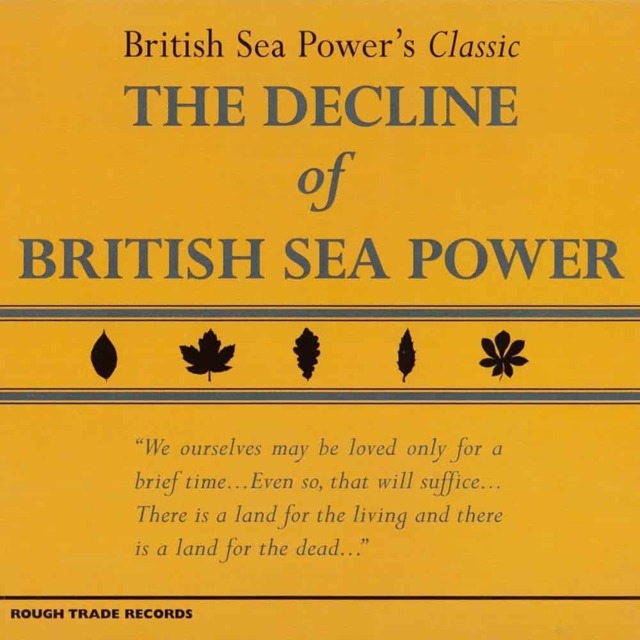
Sea Power née British Sea Power occupy an oddly personal place in my mind because when they released their first album The Decline of British Sea Power far back in the bygone age of 2003, it was the first record I ever bought based solely on the cover art. My gamble was rewarded with some of the smartest, catchiest, and coolest music I'd yet heard in my nascent career as a music snob. Unfortunately it also convinced me that I was some kind of genius capable of gauging the quality of a record's music just by looking at the cover, a narcissistic delusion I would waste a great deal of money and time laboring under until I finally accepted I'd just gotten lucky once. This was of course no fault of British Sea Power's, and I continue to follow their long and storied career as a semi-loyal fan to this very day.
The Decline of British Sea Power was, in addition to being some damn good music, a kind of mission statement for the band, a means of presenting their endeavors as an attempt, both artistic and political, to navigate the decline of their native isle as a world power; to find a way to retain the good things about being British while also escaping the sclerotic grip Britain's supposedly glorious imperial past still maintained on so much of the national psyche. This was a particularly daunting project to undertake in 2003, when Prime Minister Tony Blair, in open opposition to the popular will of the British people, so eagerly and blindly trotted behind the USA into the gaping hellmouth of the second Iraq War.
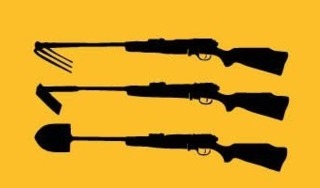
The abridged quote on the album's cover is from Thornton Wilder's novel The Bridge of San Luis Rey, a story about a friar seeking some spiritual rationale for a random disaster that claimed the lives of five innocent people. It is a message describing the attempt to salvage future love from past tragedy, one that gestures toward British Sea Power's broad artistic ambitions. The message of the art on the back of the album is more direct, depicting three rifles with their barrels transformed into a plow, hoe, and shovel, a representation of weapons of war being refashioned into tools of peace, a biblical allusion to Isaiah chapter 2 verse four, which in the Contemporary English Version reads “He will settle arguments between nations. They will pound their swords and their spears into rakes and shovels; they will never make war or attack one another.”
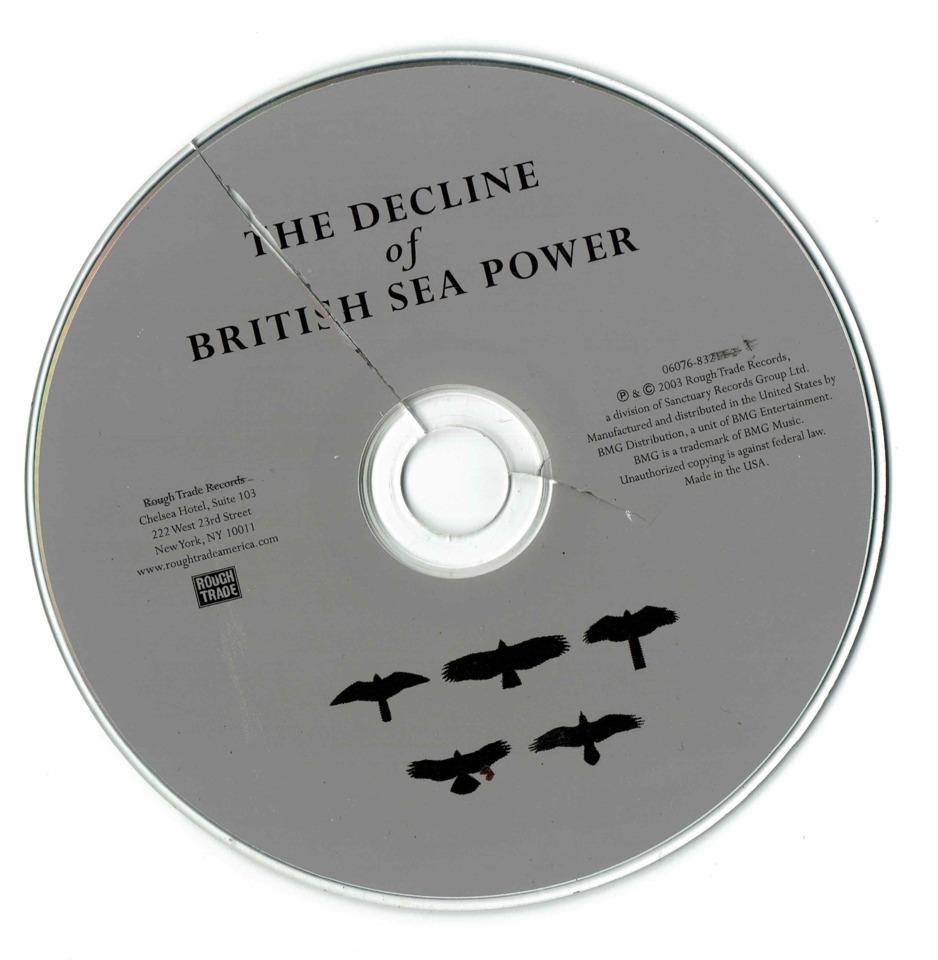
British Sea Power's debut 2003 album is a message of ardent hope, an appeal to the best impulses of their audience, a gesture toward a future of peace and and compassion, to tame the savageness of man and make gentle the life of this world.
It is a message the procession of of one damn thing after another has rendered inapplicable to the present moment, a time when warped and mangled history has become a force for such irredeemable acrimony it's reached the point where people of conscience can only hope to distance themselves from it, as the rechristened Sea Power has.
Art requires a certain degree of ambiguity to exist at all. As I've already outlined in excruciating detail, art without any room for interpretation is propaganda.
The same is true of identity. When founding brothers Yan and Neil Wilkinson first named their band British Sea Power, the public was not fixated on defining what was and was not British in absolute terms, and thus the subject was open to artistic exploration.
It's easy to imagine Robert Kurvitz, firsthand witness to the Bronze Night statue wars, seeing British Sea Power's music video for their song Remember Me and recognizing kindred spirits, artists whose feelings regarding monumental displays of idealized history were also mixed at best.
The world as it exists now allows for no such nuance. The idea of nationalism, pushed to ever more far-right extremes, has become morally indefensible. Being British is no longer defined by who and what is included, but by who and what is excluded—thus identity is twisted into one fixed, impenetrable shape, a blunt instrument designed to bludgeon all attempts at nuance into a bloody pulp.
All totalitarianism is, at its root, the result of an inability to tolerate ambiguity. It is borne of a fervent, misguided craving for (to paraphrase H.L. Mencken) complex problems to have simple, neat solutions. After all, if you know exactly what the solution to a problem is, nothing you do in pursuit of that ultimate solution can possibly be wrong. This is also why (to paraphrase W.B. Yeats) the best so often lack conviction, while the worst are full of passionate intensity. So, with all of this in mind, what (to paraphrase Sisqó) do we do, and what do we be? Where do the best, or those at least seeking to attain to some small measure of bestness, look for comfort in a world grown hostile?
What should they seek to attain?
The answer, if the ending of Disco Elysium is any indication, is a decisive 'Nothing tangible'.
And All I Got Was This Lousy Transcendence
"There persists a notion that that humanity will learn lessons as a result of the upcoming collapses and that human denial has a limit (a notion mentally sustainable only because it doesn't). In fact the best we find at land's end is a society where the considered life plan is still a choice of which exalted con-game to fall for." -Steve Aylett
"It's sad now how the glass looks rather empty, the formulation of the elements makes you yearn, what's done is done, and there'll be no redemption, just periodic tables to be learned" -Sea Power
As someone who's written a great deal of fiction themselves and even kind of got paid for it once (food stamps count) I am keenly aware of just how monumentally difficult it is to endow a story with a satisfying ending after you've done everything in your authorial power to peel away the inauthentic parts of human life that either don't withstand scrutiny, or prove useless in your hour of greatest need.
It must be stated that, no matter how fulfilling or disappointing Disco Elysium's ending ultimately is, Robert Kurvitz and ZA/UM must be commended for following the ideas and themes of their story to their logical conclusions without resorting to empty platitudes or trite clichés, and having the courage to willfully deny us the easy answers we crave.
Whether or not they manage to provide a satisfying alternative is another question entirely.
Even before you, in the person of Harrier "Harry" Du Bois, arrest the guilty party who committed the murder that set the plot of Disco Elysium in motion, bringing the perpetrator to justice has been trivialized, rendered totally moot since all the bad things arresting him was supposed to prevent have already come to pass: the tension afflicting Revachol has overflowed, multiple people are dead, complicit parties have fled, the defining conflict between labor and management that's torn the island apart has entered a state of permanent deadlock. Even the idea of arresting the murderer in the name of some vague, abstract ideal of justice has been thoroughly debunked, the system you serve exposed as hollow and corrupt.
You venture out to a small island to arrest the guilty party anyway, seemingly for lack of anything better to do.
Estonia possesses 1,500 islands beyond where its western and northern shores trail off into the Baltic Sea, and while they constitute 10% of the nation's territory, only two are large enough to support human occupants. These two islands, Saaremaa and Hiiumaa, both functioned as Soviet military outposts in the forty four years between the end of World War Two and the beginning of the Soviet Union's collapse. Both islands still bear the lingering hallmarks of Soviet occupation, including forts, listening posts, and the one Red Army war memorial that probably won't be removed by the Estonian government, though its inscription will likely be changed.

Disco Elysium ends with Harry Du Bois encountering a similar derelict relic of a bygone communist era on a remote island off the coast of Revachol, though this particular squalid ruin takes the form of a human being, or what at least was one before he was voluntarily trampled by the rampaging passage of time.
Military holdouts are nothing new. After all, the more we lose, the more unwilling we become to accept that our sacrifices were in vain. The need for meaning is hardwired into the human brain from cradle to grave, the sunk cost fallacy as fundamental to our species as using language, using tools, and using language to act like tools. Wanting to start a new war in order to regain what you lost in the previous war is so common there's even a specific word for it: 'revanchism', which is derived from the root words 'revan', meaning revenge, and 'chism', which according to Google is a slang term for the fluids produced during sexual intercourse.

Anyway, there are always soldiers who refuse to admit defeat when a war is lost, but there seems to be something about islands that sends this impulse into overdrive. Real world examples of this phenomenon are the Japanese soldiers from World War Two who continued to occupy islands long since conquered by the Allies, the most famous of which is probably the case of Hiroo Onoda, a soldier who remained in the Philippines for twenty nine years until his former commander returned in person to officially relieve him of duty by order of the emperor in 1974.
The murderer you likewise reach on an island at the conclusion of Disco Elysium's story, one Iosef Lilianovich Dros, is also a holdout from Revachol's long vanquished military ambitions, but his motives are ultimately revealed to be far more base than simple loyalty, a fetid mix of spite and jealousy that have allowed him to remain a living artifact, watching the historic procession of one damn thing after another through a rifle scope, rendering him a hollow and pathetic wastrel who yet manages to contaminate the present, arising like a long dormant cancer and attacking with savage malignance to trigger an outbreak of chaos and violence with a single well-aimed bullet delivered from his antique standard issue firearm; one more sullen outburst from a squalid past that refuses to just fucking die already.
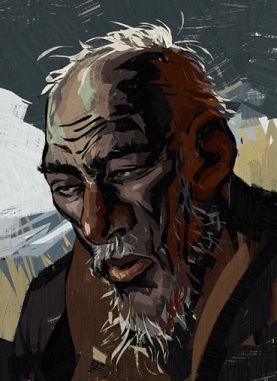
Though he can be made to give up his real name, Disco Elysium identifies Iosef Lilianovich Dros simply as The Deserter. While this is technically true in a military sense since he did indeed abandon his post in the revolutionary militia when Revachol's communist uprising was violently subdued, there's no good reason to condemn him for it—he was only fifteen years old at the time, and if he'd stayed behind he only would have been slaughtered with the rest of his comrades. No, Iosef Lilianovich Dros's desertion is far more fundamental and tragic, for if life and history are indeed both one damn thing after another, The Deserter chose the wrong damn thing, abandoning the uncertain promise of living life for the objectively false promise of making history, choosing to dedicate the remainder of his life to a world historical narrative that amounts to pure fiction. He is acting under the idiotic, suicidal principle that has fueled so many intractable military quagmires, namely: as long as he doesn't give up, he can't really have lost.
We have all met people like The Deserter, people who have decided their ideology is infallible, their weltanschauung is perfect, and they regard the rest of the world going on around them in a state of perpetual agitation, viewing its every failure to act in accordance with their one true faith to be a personal affront as they grow ever more remote from anything resembling real life, eventually reaching the point where they can't exist outside their squalid refuge of sanctimonious outrage, only venturing out to strike at those they see as having betrayed The Cause.
We have all been that person at one time or another.
Most of us manage to find a way out.
And maintain the public pretense that we don't think we're right about everything all the time.
Even though we secretly know we are.
Though physically isolated from the wider world, the Deserter has made no effort to banish it from his mind, continuing to follow the news coming out of Revachol and even making clandestine visits to it. The murder that kicked off the events of Disco Elysium isn't even his first, and the Deserter openly admits to having killed a union leader he deemed too moderate, and thus a traitor to the pure and absolute communist cause he remains fixated upon.

It's worth noting that the Deserter does not bother killing those inhabitants of Revachol who are actually opposed to communism, but rather those he's deemed to be socialists who are not socialist enough, people who don't measure up to his own personal brand of extreme political zealotry. It's a clear case of what Freud dubbed the 'narcissism of small differences', a phenomenon where, the more homogeneous a community is, the more they obsess over the tiniest deviations from orthodoxy as the perfect inevitably becomes the enemy of the good, resulting in social phenomena like the insanely complex system of racial categorization in Haiti, or the inquisitorial Red Scare that infected postwar America.
As the Deserter continued his isolated watch over Revachol, he came to be obsessed with a particular woman, developing a parasocial relationship as he projected all his fantasies of communist purity onto her. This was why, when he saw her having sex with one of the mercenaries sent to break the dockworker's strike, he reacted so violently, intending to fatally shoot both of them mid-coitus, but ultimately settling for just killing the mercenary. The Deserter readily confesses to this when you reach his island and confront him, eagerly delivering all the exposition you could possibly want before his brain finally putrefies for good, all his higher cognitive functions abruptly dissolving as Disco Elysium's ending takes an abrupt turn for the Cryptozoological, and you're brought face to face with a mysterious, ethereal being, the only sentient creature in the game that can honestly claim to exist outside the flow of history: the Insulindian Phasmid.
The Insulindian Phasmid that arises from its perfectly camouflaged spot in a nearby cluster of reeds after you're finished interrogating the Deserter is a gigantic insect, but it bears none of the monstrous attributes normally associated with such creatures. The impression made by the Insulindian Phasmid is not one of menacing hunger but extreme delicacy and—if you can manage to get close enough to form a psychic bond—wisdom.
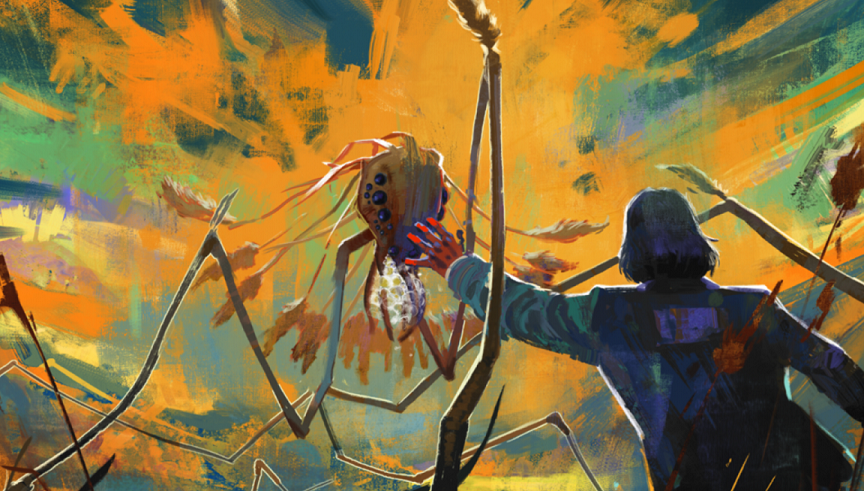
Encountering the Insulindian Phasmid is the true climax of Disco Elysium, an instance of seemingly meaningless toil rewarded by communion with the infinite. It is the point in the story that Joseph Campbell, in his book The Hero With A Thousand Faces, identified as the archetypal Meeting With The Goddess:
This is the crisis at the nadir, at the zenith, or at the uttermost edge of the earth, at the central point of the cosmos, in the tabernacle of the temple, or within the darkness of the deepest chamber in the heart … For she is the incarnation of the promise of perfection; the soul's assurance that, at the conclusion of its exile in a world of organized inadequacies, the bliss that once was known will be known again; … Time sealed her away, yet she is dwelling still, like one who sleeps in timelessness, at the bottom of the timeless sea. [third edition 2008]
The Insulindian Phasmid is able to exist outside the historical barrage of one damn thing after another, freeing itself from all the error and evil humanity is subject to as our species walks backwards into the future. It is gentle, delicate, truthful, and—in its own strange way—beautiful. Its voice is distorted, but also soft and lilting. The things it tells us are both inscrutable and brutally honest, as it casually prophesies the immanent end of all life on the planet.

The encounter with the Insulindian Phasmid recontextualizes who we are as embodied in Harrier "Harry" Du Bois, uprooting us from the grim, intractable reality we associate our existence with, dislodging us so we're forced to look at ourselves from the outside and see how we are but one small part of some incomprehensibly vaster reality.
It is the benevolent mirror, free of furies.
However, the folks at ZA/UM are careful to nip any possible sense of hope we might derive from this mystic encounter in the bud.
Just in case the significance of our meeting with the Insulindian Phasmid is lost on us, it says exactly what it means in no uncertain terms:
The moral of our encounter is: I am a relatively median lifeform -- while it is you who are total, extreme madness. A volatile simian nervous system, ominously new to the planet. The pale, too, came with you. No one remembers it before you. The cnidarians do not, the radially symmetricals do not. There is an almost unanimous agreement between the birds and the plants that you are going to destroy us all.
In Disco Elysium the Pale is a force that is vague in nature but devastating in effect, a kind of existential dry rot that is making all reality come apart at the seams. It's obviously a metaphor, but for precisely what is open to endless interpretation—it could be death or heartbreak or climate change or depression or entropy—either way your planet is doomed.
However, transcendent being that it is, the Insulindian Phasmid also has no problem contradicting itself, urging you to turn and go forward, to do it for the working class.
Meanwhile, for your part, the best you can do is snap a photograph of the Insulindian Phasmid, managing to capture it, ever so fleetingly, as existing alongside you in the squalid flow of time, while also proving that you yourself were able to make some sort of contact with a being that is transcendent, timeless, and immune to the withering cycle of one damn thing after another.
Overwhelmed by the camera's flash, the Insulindian Phasmid departs, receding back into another, alternative plane of existence, leaving you once more to face stupid reality again.
The game ends, leaving us players, in turn, to face our own stupid reality again, returning us to our own world of organized inadequacies, a world where god is dead and the rent's due tomorrow; a world that is, to the best of my knowledge, devoid of giant psychic stick insects willing to soothe our broken hearts.
Another day, another damn thing.
Only The Future Crabs Can Judge Me
"I want nothing. I just want the emptiness to mean something." -Ernest Hemingway
"You're only here for a while, and it's all a joke." -British Sea Power
If you're like me—and, as is the case with most people, I'm utterly incapable of imagining you aren't—you've been tormented day and night by the ultimate burning question: Will the crabs be the ones to judge us in the thirtieth century? Fortunately for all of us, eminent philosopher Hazel Barnes has the answer. [skip to 2:50:50 if video starts from beginning]
Yes, the crabs, infamously the most judgmental of all decapod crustaceans, surpassing even lobsters in their raw, pitiless scrutiny.
Doctor Barnes is speaking in reference to the 1959 Jean-Paul Sartre play The Condemned of Altona, wherein the character Franz von Gerlach is consumed by guilt over the atrocities he committed during World War Two and, in his madness, has become fixated on the idea that crab beings in the distant future are looking back through time and judging every decision made by humanity. Von Gerlach believes himself to be the sole defendant of humanity's actions during the twentieth century, and is obsessed with redeeming humanity in the eyestalks of future crabmanity. It is a vivid depiction of how the burden of the future's judgment weighs upon us all, the idea of history as the great arbiter of all things made horribly, crabbily manifest.

Sartre doesn't chose crabs because they're so gosh darn amusing—1959 was a time before crab memes took over the internet, it was really still more of an 'all your base are belong to us' era—but rather because he believes the minds of future generations, be they humans, crabs, or some kind crab-human hybrid (the only three possibilities) are utterly unknowable to us. We do not and can not know how they will think, what they will believe, what the world they live in will look like, or how they will react to it.
Of course, as befits his existentialist philosophy, the ultimate message of Sartre's play is that there is no transcendent force passing judgment on us, be it god, crabs, or crab gods such as Crabula, god of walking sideways and Crabulon, god of pinching—we are quite capable of condemning ourselves, thank you very much.
The image we have of future generations picking apart every detail of our lives is largely vanity. The past is prelude, but that's all it is, and the vast majority of those who follow us will be too busy struggling through their own lives to fixate on just how much we managed to fuck up our own. Even if thirtieth century crabs could look back in time to judge us most wouldn't bother, they'd be too busy mastering whatever the hot new dance burning up whatever the future crab version of TikTok is, probably some form of crab twerking that will make the elder generation of future crabs shake their thoraxes in disgust.
Disco Elysium knows all this. Everything that happens in its lovingly ugly story is the sum total of history's many and varied derangements, yet as events play out, it becomes abundantly clear that how precisely we reached this point is not as important as what we do now that we're here; most importantly, how we choose to treat one another, even as we are systematically deprived of everything that matters to us.
Disco Elysium is very explicit in telling us that we are not going to unseat the powers that be anytime soon, and whatever mask power chooses to wear, it will continue to exploit us for the foreseeable future. It's a message that has significantly more weight coming from a developer based in Estonia, a nation that has (I think I'll say it again.) come by its cynicism honestly. It's a perspective we would do well to at least consider in a world where the old rules simply no longer apply, which isn't to say they ever really did, at least not in the way humanity dreamed.
It is virtually impossible to overstate how much our ancestors believed in the future. The possibility that the ideology they clung to was based on false pretenses or that entrenched interests would be willing to burn the world to retain their power were easily brushed aside as their optimistic zeal propelled them toward an ill-defined, yet undeniably superior future that would make the present look like a second Dark Age. When that didn't happen, many people either doubled down on their beliefs or swung hard in the opposite direction. Disco Elysium depicts all this and more, presenting a vast topographic map of human idealism and nihilism, charting all the ways individuals and groups react to an indifferent universe and absurd existence. The game takes a special interest in how people attempt to craft art in the face of such destitution, though it also takes pains to not romanticize such efforts, and the distinction between art and vandalism is often slim to none. Revachol is a place where an effort to turn an abandoned church into a music venue is just as likely an attempt to establish a front for a drug dealing operation, and Disco Elysium leaves it for us to decide whether one establishment has more intrinsic social value than another, regarding the relative utility of the opiate of the masses and the opiate of the drug addicts as more or less a toss up.
Art tends to outlast values. To cite a previous example, Greek tragedy from 2,500 years ago has some of the most rich, nuanced, and multidimensional female characters ever depicted in fiction. How the hell this managed to happen in a society were women were not allowed to write, act in, or even watch theater and lived their lives as prisoners in their own homes will be a matter of perennial debate, yet the fact remains we are all richer for it. (The theater, not the misogyny.)

Likewise, I do not think the past and future will be so mutually unintelligible as Sartre fancies it will be in The Condemned of Altona. I am inclined to believe that no matter how different than us future beings ultimately become, they will still be able to appreciate something like Disco Elysium, assuming advances in video game accessibility will allow the crabs of the thirtieth century to hold controllers in their crude yet mighty claws. Unfortunately, this will also bring them face to antennae with the harsh reality that while Disco Elysium tells a very good story, not a very good video game.
While I, like so many others, was blown away by Disco Elysium's writing, progressing through the game to reveal more of Revachol was a mostly underwhelming, sometimes tedious, and occasionally frustrating experience where the dice roll mechanics felt like an arbitrary hindrance rather than something that served to engage the player and propel the narrative forward.
As Sisqó in his inestimable wisdom once proclaimed, I don't mean no disrespeezy. Disco Elysium's writing is so extraordinarily good, its approach to depicting how characters react to their environment so deep, I would sill recommend playing it to anyone seeking a good story.
I naturally have my own quibbles with the writing, but such minor objections seem irrelevant when Disco Elysium is contrasted with more popular video games that presume to engage with real, contemporary political issues. It's easy to laugh at the violent stupidity of something the Call of Duty Modern Warfare 2 campaign, a story that divides the world into selfless warrior poet bros and uppity brown people who need to be shown their place and are made to vomit idiotic dialogue such as “As long as there is a war on terror, there will be no real war on drugs.”
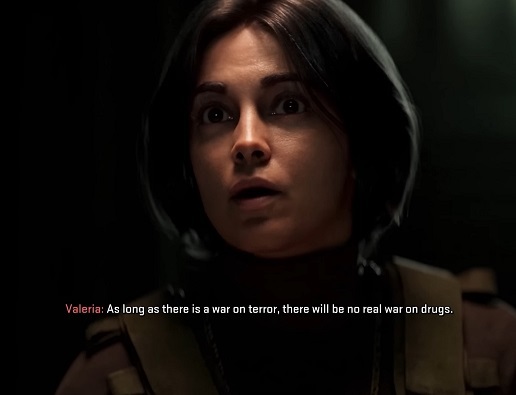
It's easy to scoff at such idiocies, but it is also very depressing to think the world is full of people who really think in such terms, and serves to illustrate why a story as rich and insightful as Disco Elysium's must be praised to the heavens, even they're empty.
Extinction Agenda
“Let us beware, lest our lack of imagination impoverish the future.” -Simone de Beauvoir
"We only want to make you happy, in the world that can seem sad sometimes, we only want to make you happy" -Sea Power
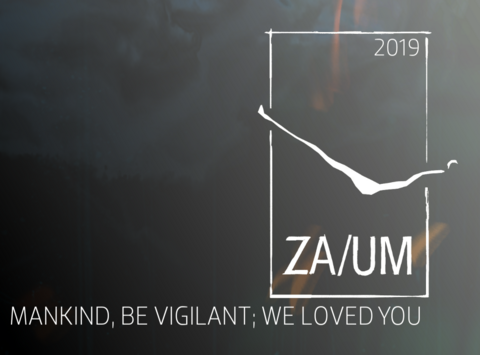
Humans are the only creatures on Earth capable of imagining a future beyond their own existence. They are the only creatures who know they will die, the only ones who can grasp the ramifications of their immanent absence from the world.
Whether or not the massive overabundance of intelligence humans evolved to have is actually any kind of advantage in our continuing survival on this planet remains to be seen. Dinosaurs had famously small brains incapable of producing any behavior beyond that most essential to survival, but it didn't stop them from ruling the planet for one hundred and sixty five million years, while we naked apes have come within spitting distance of extinction in a paltry three hundred thousand. Dinosaurs could very well still be the dominant lifeform on Earth if a fortuitous asteroid hadn't wiped them out and given our small mammalian ancestors a chance to step into the power vacuum, while all the while the crabs sat on the sidelines, biding their time while rubbing their claws together in malicious glee.
Now, as I exhaust my supply of crab jokes and move to bring this piece to its ultimate conclusion, canny readers will have no doubt noticed some glaring omissions. I've made no attempt to address the various catastrophes that have befallen Europe in general and ZA/UM in particular in the period after Disco Elysium's release for many reasons, the most pertinent one being that if I tried keep up with the march of time, this thing would never end. I've done my best to educate, as well as horrify, but the fact remains there will always be a next damn thing.
I write this knowing that, like all human works, it will remain fundamentally incomplete. There will inevitably be mistakes that range from minor typos to glaring factual errors like that time I said Dracula was the president of Transylvania, only to later realize Dracula is a fictional character, and therefore ineligible for public office. I've done my best to make peace with it.
The human project will remain forever incomplete, and as angst-inducing as that is, attempting to force a happy ending on it is infinitely worse. Conclusions are for narratives, be they fictional stories like Disco Elysium or attempts to investigate and contextualize the many things that go into into something like Disco Elysium that wander from political dissolution to Estonian history to ancient Greek tragedy to contemporary British art rock to that time I got my hand stuck in a toilet.
On to the next damn thing, which, if how this piece turned out is any indication, will probably be something about how Tetris influenced the rise of third wave feminism, which can itself only be understood within the context of the profound cultural impact of the Air Bud franchise.

Log in to comment